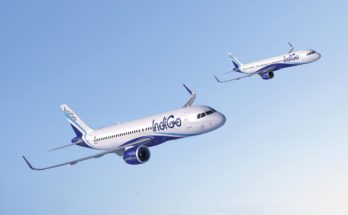by J. Kasper Oestergaard, European Correspondent.

On November 3, 2017, Emirates celebrated the milestone delivery of its 100th A380 aircraft at a special ceremony with Airbus at the manufacturer’s delivery center in Hamburg. Photo Courtesy Airbus SAS
While the Airbus A380 is a fantastic aircraft for passengers to fly on and an engineering marvel, it is not a secret that the superjumbo has been a major financial disappointment for Airbus.
Nevertheless, one airline loves the A380 like no other. On November 3, 2017, Emirates officially took delivery of its A380 #100. The milestone delivery was celebrated at an event at the Airbus delivery center in Hamburg, Germany, attended by Sheik Ahmed bin Saeed Al-Maktoum, chairman and CEO of Emirates; Tim Clark, president of Emirates airline; Tom Enders, Airbus’ CEO; the UAE ambassador to Germany; supplier representatives; and local German officials.
At the event, Sheik Ahmed touted the A380’s impact on aerospace manufacturing and the broader aviation industry, supporting hundreds of thousands of jobs and stimulating innovation and new product development in many related areas such as ground handling, catering, airport facilities, and cabin products. According to Sheik Ahmed, for Emirates itself, the A380 has been a great success. He commended the A380 for offering efficiency benefits and cited the high-capacity aircraft’s suitability for slot-constrained airports. He added that passengers prefer the A380 because it offers more comfort than other aircraft, and reduced cabin noise.
So what is in store for the A380 in the future? Airbus delivered approximately 30 aircraft per year through 2016 but has cut its build rate to 15 in 2017, 12 in 2018, and only 8 in 2019. It would seem Airbus’ plan is to keep the production line running for as long as possible toward the day when passenger numbers and airport constraints revive demand for the aircraft. And unlike rival Boeing and the 747, Airbus has not removed the A380 from its long-term forecast. Airbus delivered 216 A380s through September 30, 2017, of which almost half went to Emirates. The company had 101 orders in backlog at the end of September and, at an annual production rate of only 8 from 2019 onward, the current backlog covers almost the entire 2020s. This is in line with Airbus CEO Tom Enders’ thoughts on the matter, having recently said that Airbus will most likely be producing the A380 10 years from now.
At Paris Air Show 2017 in June, Airbus unveiled the so-called A380plus, which adds fuel-saving upgrades in a bid to increase range or carry extra passengers. New large winglets and other wing refinements will allow for up to 4 percent fuel burn savings, according to Airbus. With the A380plus, Airbus adds to the appeal and economics of the jet without investing a large sum of money in a platform that is already struggling financially. An A380neo and a stretch variant had been announced earlier but would have been too costly, even with top customer Emirates pushing heavily for a major upgrade.
The big question is, when will passenger volumes at a substantial number of major hubs reach a level where demand can only be met by A380/747-sized jets? At present, the 787 and A350 are drawing passengers away from major hubs – something that will further delay an A380 revival. And what will happen to new-build demand when the first A380 leases expire in a few years and aircraft begin to hit the secondary market if those leases are not renewed? And will there be replacement demand when the first aircraft hit their economic life (assumed to be 20 years) by 2027? An A380 cargo variant is extremely unlikely, as the aircraft is very inefficient at carrying payload. Anyone who has calculated how many cargo ton-miles the A380 gets you per gallon of fuel will know exactly what I mean. As a cargo plane, the A380 would simply hit its payload limit well before the fuselage is full.
A small break for the superjumbo could arrive at this month’s Dubai Air Show. Sheik Ahmed has stated that Emirates hopes to order additional A380s at the event, saying that negotiating teams were working on it.
In conclusion, the A380 is most likely not going out of production soon, as both Airbus and Emirates remain committed to the platform. Its long-term viability and demand, however, depend on passenger growth figures, traffic flow patterns, the introduction of a secondary market for used A380s, and the price of oil. If the current backlog is maintained and sustainable demand does pick up during the early-mid 2020s, the A380 could be saved.
References:
http://www.aircraft.airbus.com/market/orders-deliveries/
http://www.aviationbusinessme.com/airlines/airline-operations/2017/nov/5/449200/
For 50 years, Forecast International intelligence reports have been the aerospace and defense industry standard for accurate research, analysis, and projections. Our experienced analysts compile, evaluate, and present accurate data for decision makers. FI's market research reports offer concise analysis of individual programs and identify market opportunities. Each report includes a program overview, detailed statistics, recent developments and a competitive analysis, culminating in production forecasts spanning 10 or 15 years. Let our market intelligence reports be a key part of reducing uncertainties and mastering your specific market and its growth potential. Find out more at www.forecastinternational.com



